Editorial

Dear Members,
Welcome to our ‘launch’ edition of Excipients Insight for 2021!
And as ever, the year began with our annual event and reflecting back on it, it was refreshing to see so many new and familiar people connected to our first virtual Forum. We had a good attendance from across our membership on both days and the highest number of non-members registered in the past five years. This confirms the validity of the agenda and that we included the right topics in terms of current and future challenges. Once more, thanks to the Secretariat and the Event Committee for delivering such a great programme via an innovative platform. For those of you who were not able to attend, this edition includes a comprehensive report of the proceedings and direct access to the presentations.
This year’s feeling was different for sure, and yet still very successful, not least due to your contributions that added many insights to the topics presented. Thank you! Nonetheless, I am certain many of us missed the buzz of ‘IPEC week’, with its networking and many gatherings such as the IPEC Europe Annual General Meeting (AGM) which usually takes place on the Friday after the Forum. However, this year, the AGM will be hosted online on Wednesday 9 June. Make a note in your diary! Further information to follow.
There is added value in direct face-to-face discussions and we will always try to hold “live” events whenever possible. And talking of future events, the IPEC Europe Excipient Conference will take place on 22 and 23 September 2021 in Frankfurt, Germany, or as a virtual event if restrictions on public events remain - you can see more information on our website. We will keep you posted.
The Board met online in January, reflecting on the New Year and our goals, one of which is to increase knowledge sharing activities with our members. And to start that process, we invite everybody to join us on 25 March to hear more about IPEC Europe’s key activities and plans for webinars and updates on ‘hot topics’. We are eager to seek your input and feedback on both IPEC Europe’s and the IPEC Federation’s activities. As the year progresses, we will have an in depth look at some of the subjects raised during quarterly catch-ups (a new innovation for 2021) and review your feedback on existing actions. Your comments on what we are doing and what you think we should be doing are always welcome at info@ipec-europe.org. As are volunteers to join our various committees and task forces.
In the meantime, I wish you all a good start to the year, and …. Stay safe!
Frithjof Holtz
IPEC Europe Chair
IPEC Europe Excipients virtual Forum 2021 - Part 1
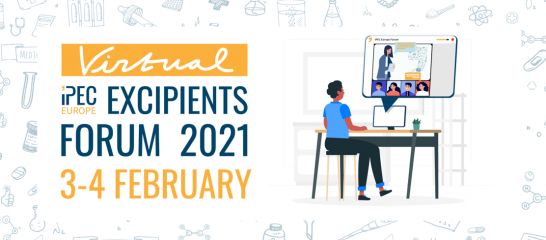
On 3 and 4 February, the IPEC Europe Excipients Virtual Forum 2021 provided a great opportunity to get up-to-date on some of the ‘hot topics’ affecting excipients, including the role of pharmacopoeias in the COVID-19 crisis, quality by design, vaccines, nitrosamines.
IPEC Europe’s chair, Frithjof Holtz, welcomed participants and introduced the speakers of the first session.
Click on the titles to re-watch the presentations.
Dr. Susanne Keitel – EDQM and COVID-19
Dr Keitel launched the afternoon presenting how the EDQM maintained its support of the quality of medicines in a pandemic situation. With 90% of the staff homeworking, EDQM managed to progress all projects while adapting to this extraordinary situation. The organisation reinforced its collaboration with its international partners (National and World Pharmacopoeias, EMA) and stakeholders (industry association such as IPEC Europe). By April 2020, EDQM had created a dedicated web page to relay up-to-date information on EDQM’s activities relating to COVDI-19. EDQM ensured the continued availability of reference standards especially for substances used in clinical trials and to treat COVID-19 symptoms. Also, pharmacopoeial texts relevant for antiviral medicines were made freely available on the Ph. Eur and BP websites. Emphasis was given to the efficiency of the OCABR (Official Control Authority Batch Release) network to guarantee transparent communication and rapid actions. This allowed the collection of the necessary information to prepare the relevant OCABR guidelines – the first one was published in November 2020 - and speed up the certification process. In December 2020, there were 214 candidate vaccine projects developed by pharma companies and also SMEs and universities, for whom support to interpret for regulatory/compendial requirements was made available. To help the latter, EDQM provided a free-of-charge ‘COVID-19 vaccines package’ including key pharmacopeial texts and the appropriate training materials to apply Ph. Eur standards. On 3 November 2020, EDQM published a text – not a monograph or general chapter – on viral-vectored vaccines giving guidance to develop analytical strategy to help developers. As for the CEPs, EDQM adjusted its priorities to ensure the availability of APIs critical to the treatment of COVID-19. Dr Keitel concluded that without compromising other activities, EDQM is invested in the fight against COVID-19.
Chen Lei – Chinese Pharmacopoeia
Next, staying on a pharmacopoeial topic, Ms Chen Lei – representing the Chinese Pharmacopoeia Commission – updated delegates on the Present and Future of Pharmaceutical Excipient Standards in ChP. After a brief overview on the history, structure and concepts of ChP, Ms Chen Lei detailed the importance of pharmaceutical exicpients in the history of ChP and most recently the revisions made in General Chapter 0251 on Pharmaceutical Excipients (unofficial translation by IPEC China) in the 2020 version of the Pharmacopoeia. There, explained Ms Chen Lei, three key aspects are defined: the authority of excipients standards in ChP, the “first choice” principle , the process to keep standards up-to-date through revisions. Ms Chen Lei explained how the CPC is enhancing the quality of excipient monograph standards while adding new standards (the ChP edition includes 335 monographs, up from 132 ten years ago). Further efforts were made to promote harmonisation with other pharmacopoeias through standardisation and testing.
Moving to the FRCs (functionality-related characteristics) standard system, Chen Lei acknowledged the importance of feedback received through IPECs to describe the changes implemented.
The CPC is eyeing to improve the standard system of water for pharmaceutical used, further standardise the system on FRCs and to further harmonise standards with ICH documents.
Ms Chen Lei concluded that an English version of the ChP 2020 is being printed and will be available soon. The pre-recorded Q&A session is available here.
Dr. Andrew Teasdale - N-Nitrosamines and the link to Excipients
N-nitrosamines are never far away from pharmaceutical headlines and Dr Andy Teasdale of AstraZeneca addressed the Forum with the perplexing title of N-Nitrosamines - Exploring the Universe or avoiding the black hole! This is a very complex subject and Andy stressed the importance of understanding how a measured approach is needed to allow focus on more critical areas due to the potential carcinogenicity of these compounds. The issue presented itself via the detection of N-nitrosamines in valsartan, used to treat cardiovascular conditions, but this quicky expanded to encompass the whole class of sartan drugs and beyond. In valsartan’s case, a ‘perfect storm’ of changes intended to improve process safety resulted in N-nitrosamine generation. On detection, regulatory actions followed and in the European Union Marketing Authorisation Holders were ultimately obligated to estimate the risk of N-nitrosamine contamination and formation in every concerned medicinal product in the market. More recently, biologicals, packaging materials and diagnostics were included in scope. This requires significant effort but companies are collaborating to standardise approaches, facilitated for example, by (API and drug product) decision trees published by EFPIA. A lot of knowledge catch-up work has been done and includes excipient manufacturers. It is known that some pharmaceutical excipients contain Nitrites (these are a precursor to possible formation of N-nitrosamines within the drug product) and hence are an important part of the risk assessment process. However, data becoming available suggest that nitrite levels are present at the level of 1-5 ppm in common pharmaceutical grade excipients and this is helping to put risk arising from excipients into context.
Prof. Anne Gayot – Co-processed excipients
The level of interest on co-processed excipients in recent years has been high. Many programmes of events such as the IPEC Europe Forum regularly feature the latest developments and the regulatory requirements. Prof. Anne Gayot provided an informative and technology-focused presentation of what co-processed excipients are, why they play a special role, their opportunities and challenges. After an introduction on general notices on excipients and the definition of a co-processed excipient according to the Ph.Eur., Prof. Gayot reminded attendees how co-processed excipients help to maximise the performance of the functionality to that of a simple bending. Prof. Gayot then followed to provide an overview of the manufacturing methods for co-processed excipients, and the practical advantages co-processed excipients bring in.
The Dossier with presentations is available for IPEC Europe Members in the Member’s Lab: Members / Forum - Presentations. Click on the titles to re-watch the presentations.
IPEC Europe Excipients virtual Forum 2021 - Part 2
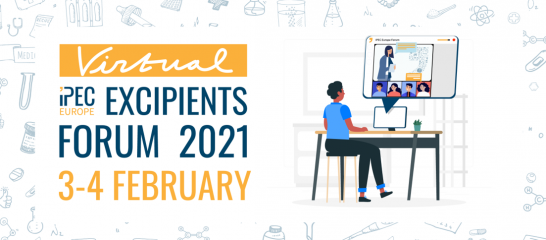
The following day (4 February) Adrian Bone, IPEC Europe Senior Advisor, opened the second session.
Prof. Brian Carlin - ICH Q13 Working Group on Continuous Manufacturing (CM)
First up was Prof. Brian Carlin, DFE Pharma, who presented the activities of the ICH Q13 Working Group on Continuous Manufacturing (CM) where he represents IPEC Federation from November 2018. Continuous manufacturing is a significant topic for IPEC members globally, and current ICH guidelines do not sufficiently address the unique requirements to CM. The transition to CM is still in its early stage, in part because start-up costs can be high, and for certain types of drugs such as biologics the technology to make them in this way is still in its infancy or absent. The ICH guideline is intended to inform development and implementation of CM for small molecules and therapeutic proteins, said Prof. Carlin, and added that the guide will have a limited impact on excipients. The informative presentation provided by Prof. Carlin helped also attendees to understand how ICH guidelines are being developed from its inception to finalisation stages. Prof. Carlin concluded that the development of the ICH Q13 guideline was not spared by COVID-19 related delays and the guide will likely be published in 2022.
Dr. Daniel Zucker - The role of excipients in vaccines
On the very topical subject of the Role of Excipients in Vaccines, Dr Daniel Zucker, Drug Regulatory Affairs Manager at Eckert & Ziegler Radiopharma GmbH, Berlin, Germany, introduced his perspectives on how excipients function as stabilisers, facilitate drug delivery and act as adjuvants in vaccine products. Information needs covering appropriate specifications, control and toxicology data requirements were presented for excipients such as polysorbate, ionisable liquids and PEGFylated lipids. Dr Zucker highlighted that while there are no specific regulatory requirements for excipients used in vaccines, the regulatory landscape is complex and there are many pharmacopoeial texts and guidances which need to be referenced to use a given excipient in the development of a vaccine. To meet the needs of a formulation, it may be necessary to require excipient quality beyond those attributes listed in pharmacopeias. Typically, new vaccine formulations rely on novel excipients to provide the desired functionality and it would only be in very exceptional circumstances that full chemical or toxicological packages akin to those for a new active substance, would not be required by regulators. Because of this it is important to acknowledge the importance of the excipient in meeting product development timelines and budget.
David Schoneker - IPEC Quality by Design (QbD) Guide
David Schoneker, President of Black Diamond Regulatory Consulting LLC, picked up the baton to present the new IPEC Incorporation of Pharmaceutical Excipients into Product Development using Quality-by-Design (QbD) Guide. The emergence of QbD in product manufacturing has changed the way we need to think about excipients, said Schoneker, with special attention to the composition variability and the impact on drug product quality. As most excipients are multi-component materials, it is a matter of “unknown unknowns”, said Schoneker, since excipient performance depends from a combination of factors. The Guide illustrates how the excipient user must define the critical material atttributes that need to be maintained throughout the product life cycle for a particular drug product based on its specific formulation. Formulators should demonstrate an enhanced understanding of the APIs, excipients, and manufacturing process. Also, information exchange is critical to all QbD projects: users and producers of excipients must have a robust communication to make sure that reciprocal needs are considered, added Schoneker. Knowledge of the characteristics of the excipients included in the formulation would reduce variability risks.
In the closing remarks, IPEC Europe Chair Frithjof Holtz thanked the speakers, the attendees and the organising Event Committee for their efforts in enabling a successful event, and reminded that in 2022 IPEC Europe will celebrate its 30th Anniversary.
The Dossier with presentations is available for IPEC Europe Members in the Member’s Lab: Members / Forum - Presentations. Click on the titles to re-watch the presentations.
IPEC Europe Annual General Meeting 2021: save the date!
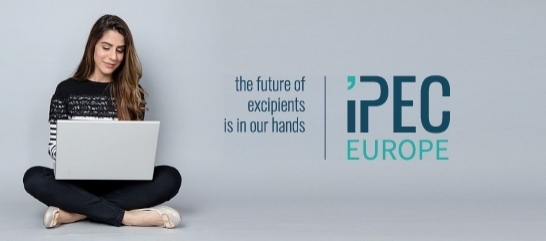
Due to the extraordinary circumstances, our Annual General Meeting (AGM), usually held beginning of the year, is postponed to Wednesday 9 June 2021, 15:00-16:30 CET (90 minutes).
Initially, the IPEC Europe Board hoped that by that time, it would be possible to organise the AGM in person. Unfortunately, the current information and measures in place in Europe let little chance that it would be possible. Hence, the AGM will be held virtually using Microsoft Teams.
You will shortly receive an invitation to mark your calendar. The formal notice by the IPEC Europe Board along with the documents for the AGM will be sent no later than 15 days prior to the meeting.
It is essential that the Official Representative of each member company attend the meeting or give proxy to vote and be represented. We will contact each of you as we get closer to the date to confirm your participation.
The AGM is opened to member representatives other than the Official Representative.
For the votes during the AGM, we will use the Teams integrated tools. Further details on how we will proceed will be provided in due course.
Finally, you will receive by anticipation the 2021 membership fee invoices in the coming days. We exceptionally issue them before the AGM to allow the association to continue to operate smoothly. Note that the amount will remain unchanged, i.e. €5,000.00 excl. VAT and will then, as per the Belgian law prescribes, be subject to the vote of the AGM.
We thank you for your understanding and support. Should you have questions and/or comments, please do not hesitate to contact the IPEC Europe Secretariat by e-mail, info@ipec-europe.org , or via phone at +32 2 213 74 40.
Updates from the IPEC Europe Board
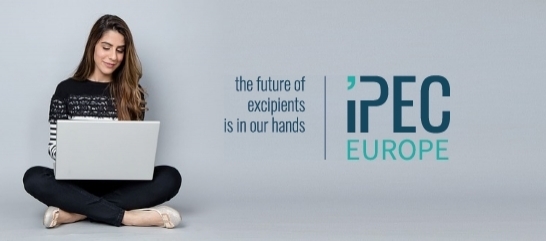
The IPEC Europe Board convened for the first virtual meeting of 2021 by web conference on 21 January. Here are some highlights:
- The Board members reviewed the Project Tracker with a special focus on on-going activities;
- Objectives for 2021 were defined and set on a number of topics, such as Regulations & Industry Guidance, Compendial Compliance, and Membership Recruitment;
- The events calendar is still disrupted by COVID-19. The IPEC Europe Excipient Conference will take place (see dedicated article) on 22-23 September.
- The Board decided to organise the AGM as a virtual meeting on Wednesday 9 June (see dedicated article).
- The Board also discussed IPEC Europe’s involvement on IPEC Federation and EXCiPACT.
The next Board meeting is scheduled on 22 April.
Virtual catch-up with members: rendez-vous on 25 March
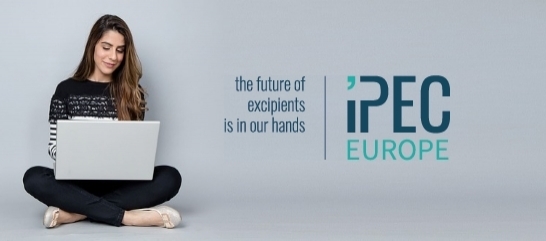
Join the first virtual catch-up and learn more on IPEC Europe and IPEC Federation key activities, and future plans for webinars and updates on "hot topics" on 25 March!
One of the objectives of the Board is to increase knowledge sharing activities with fellow IPEC Europe Members. The purpose of this catch-up is to keep you updated on the main activities in the association, and we are eager to seek your input and feedback.
The first virtual catch up will take place on Thursday 25 March, 11:30-12:30 (Brussels time) and it is reserved to members only. The agenda will be shared soon.
To register to the virtual catch-up, click on REGISTER NOW .
Alternatively, please send an e-mail to info@ipec-europe.org with subject "Virtual catch-up".
We look forward to meeting you soon!
IPEC Europe Excipient Conference: 22-23 September
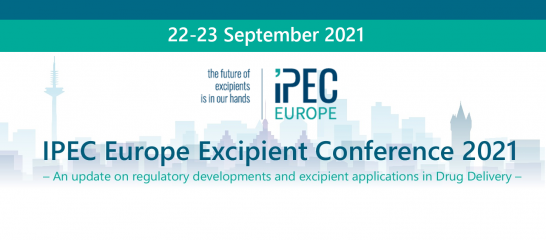
Mark your calendars! We are glad to announce that the IPEC Europe Excipient Conference, organised in cooperation with APV GmbH, will take place on 22-23 September. We are planning to hold our event on site at the hotel "Scandic Frankfurt Museumsufer" in Frankfurt/Main, Germany. We will realise this based on a comprehensive on-site preparedness plan by IPEC Europe/APV and the conference hotel. Should COVID-19 infection rates and travel restrictions not allow for an in-person conference in September, we will switch to a virtual format. In this case you will be informed in good time. Your health is our top priority. We will keep you updated about the current situation and provide you with detailed information.
For additional information, please visit the dedicated page on our website.
Making Pharmaceuticals UK back in July
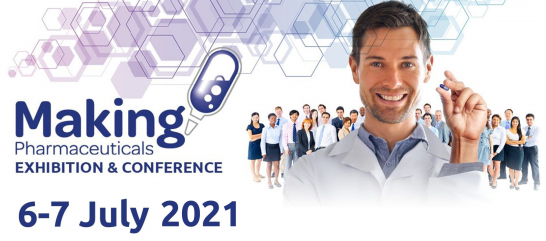
Mark your calendar: on 6-7 July 2021, Making Pharmaceuticals is coming back to the Ricoh Arena in Coventry, UK. Making Pharmaceuticals will host over 2,000 visiting pharma professionals and more than 200+ exhibitors in six exhibition zones.
Our presentations featuring in the conference this year are:
- IPEC Co-Processed Excipient Guide for Pharmaceutical Excipients– Dr. Liz Meehan, AstraZeneca / IPEC Europe Board member
- The Role of Excipients in Paediatric Formulations – Kevin Hughes, Colorcon Ltd / IPEC Europe Board member
- Excipients for Parenteral Formulations – Dr. Iain Moore, CRODA / EXCiPACT asbl President
Register for free to the Expo and conference: Making Pharma - Register now
IPEC Glossary of Terms and Acronyms updated
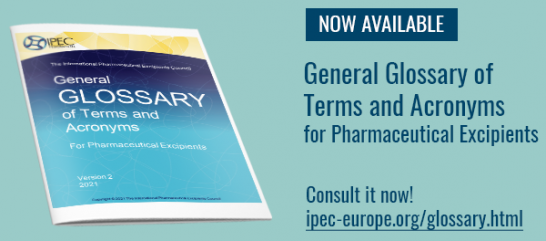
The International Pharmaceutical Excipients Council Federation, (IPEC Federation) announces the availability of the revised and updated IPEC General Glossary of Terms and Acronyms for Pharmaceutical Excipients (Version 2, 2021). The Glossary was originally published in 2014 and has been used to define excipient terms and acronyms commonly found in IPEC guides.
While updating the IPEC General Glossary of Terms and Acronyms for Pharmaceutical Excipients, the team developed a strategy with the following rationale for determining when a term/definition should be included in the IPEC Glossary:
Rationale for what terms/definitions should be included in the IPEC Glossary.
Term/definition should be one of the following:
specific to excipients
used/referenced in multiple IPEC guides
provide a better understanding of manufacture or application of an excipient
describe and/or differentiate regulatory requirements for an excipient
Terms/definitions not included in the IPEC Glossary
commonly used dictionary terms
terms generally used by other industries (e.g. SOP, SPC, API)
terms specific to one IPEC guide (better to describe and/or include reference in guide vs adding to glossary)
terms defined in other official publicly available guidances/resources (reference the guidance and/or resource for the term directly in the guide). This would not include terms only referenced in documents that must be purchased (e.g. ANSI Standard, USP).
Terms not meeting the above criteria, which are currently bolded in at least one IPEC guide (indicating definition found in the IPEC Glossary), were highlighted (along with [reference to the guide(s)]). As the current versions of these guides are updated, highlighted terms will be un-bolded and eventually removed from the IPEC General Glossary.
Another new feature to this Glossary is a column that includes reference to a list of external sources where the term has been defined. Several of the sources include ICH Guidelines and WHO Technical Reports where the definitions are often more applicable to API than excipient; therefore, the defined definition in this Glossary may have been modified to be more appropriate for an excipient.
In addition to the updated IPEC General Glossary of Terms and Acronyms for Pharmaceutical Excipients, an excel workbook containing mapping for terms and acronyms found in each of the current IPEC guides was developed and will be available to IPEC members. The Excel workbook also contains a list of ~700 pharmaceutical terms and definitions currently found and defined in external glossaries (e.g. ICH Guidelines, WHO Technical Reports, FDA Guidances and webpages).
As an IPEC Europe Member, download the Excel workbook free of charge on the Member's Lab.
You can find detailed instructions on how to access the Member's Lab here.
If you do not have access to the Member's Lab yet, please contact the Secretariat.
New IPEC Position paper: Lactose
The International Pharmaceutical Excipients Council Federation, (IPEC Federation) announces the availability of a new position paper, Pharmaceutical Grades of Lactose used in oral preparations is a low-risk excipient. This paper describes IPEC Federation’s position on the risk classification of lactose in all oral preparations.
Regulatory authorities worldwide increasingly seek to classify pharmaceutical excipients according to the risk they may present to patients when used in dosage forms.
Although lactose is derived from an animal derived material (whey), this position paper seeks to support pharmaceutical grade lactose as a low-risk excipient in oral dosage forms.
IPEC Federation considers that pharmaceutical grade lactose has a low risk profile with respect to chemical and biological risks when used in oral pharmaceutical preparations.
Therefore, this paper could help to advocate this classification status with regulatory authorities and consequently result in fewer dossier requirements for lactose when applying for marketing authorisations, thus facilitating the availability of medicines.
The position paper is available for download immediately via the website www.ipec-federation.org and regional IPEC websites.
For further information contact the IPEC Federation Secretariat at +32 2 213 74 40 or write to info@ipec-federation.org.
Read the Position Paper
Regulatory News: Europe
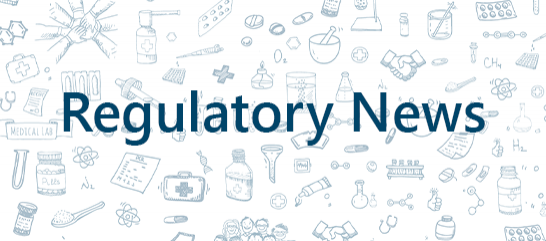
European Union
EU Pharmaceutical Strategy: structured dialogue launched
The European Commission launched a structured dialogue as part of the EU Pharmaceutical Strategy. The dialogue sets a clear objective of building an open strategic autonomy for the European Health Industry, and aims to gain a better understanding of the functioning of the global supply chains of medicines and identify causes and drivers of vulnerabilities.
European Commission / European Commission
Suspension of E171 in food in France extended to 2021
On 21st December 2020, the French Government extended its temporary suspension of the sale of food containing E171 in France. The extension is for the duration of one year and is effective from 1st January 2021.
In March 2020, the European Commission asked the EFSA to provide a new risk assessment for E171 to address any potential uncertainties.
European Directorate for Quality of Medicines (EDQM)
Pharmeuropa 33.1 released: comments until 31 March
The latest issue of Pharmeuropa contains 28 drafts published for review and comments. The full list is available here. The deadline for comments is 31 March 2021.
Pharmeuropa
Rapid implementation of the revised sartan monographs on 1 April 2021
The five monographs on sartans with a tetrazole ring, namely Valsartan (2423), Losartan potassium (2232), Irbesartan (2465), Candesartan cilexetil (2573) and Olmesartan medoxomil (2600) have been revised to align them with the latest regulatory recommendations issued by the CHMP published on November 2020. The revision concerns a rewording of the “Production” section and deletion of the N-nitrosamines test section.
Ph. Eur. Commission has decided to publish the monographs under the rapid-revision procedure. The implementation date for the five revised monographs has therefore been set as 1 April 2021.
EDQM
End of mutual recognition of Official Control Authority Batch Release (OCABR) between the EU/EEA and the UK
As of January 1st, 1 the UK is no longer part of the mutual recognition of EU/EEA OCABR. As such, mutual recognition of OCABR (and Official Batch Protocol Review (OBPR) for IVMPs) between the EU and the UK is no longer possible. The National Institute of Biological Standards and Control (NIBSC) and the OCABR network signed a Memorandum of Understanding on January 21st to make NIBSC an observer to the OCABR Network for human biologicals and reinstates the sharing of information related to batch release activity in this field.
Mutual recognition of certificates is not within the scope of this MOU.
EDQM / EDQM - New status of NIBSC
N-Nitrosamine Impurities: Latest update on the Ph. Eur. approach
This webinar provided users and stakeholders with an update on the different activities linked with N-nitrosamine impurities including a detailed overview of the new general chapter. It will also include a recap of the Ph. Eur. approach to keeping the monographs aligned with the latest regulatory decisions.
The programme included:
- The regulatory decisions and their impact on the Ph. Eur.
- Control of genotoxic impurities in the Ph. Eur.: focus on nitrosamines
- Overview of the new Ph. Eur. general chapter on control of N-nitrosamines in active substances
- An update on N-nitrosamines and CEPs
- Live Q&A session
For all updates on EDQM’s response to N-nitrosamine contamination, click here : The EDQM’s response to nitrosamine contamination
EDQM
European Medicines Agency (EMA)
International cooperation to align approaches for regulation of COVID-19 vaccines and medicines
Regulators around the globe are committed to aligning their regulatory requirements and addressing knowledge gaps to facilitate the development, authorisation and monitoring of safe, effective and high-quality vaccines and medicines against COVID-19. Discussions are ongoing under the umbrella of the ICMRA within a series of regulatory workshops focused on three areas: responding to emerging COVID-19 virus variants, addressing knowledge gaps regarding COVID-19 vaccines and treatments in pregnant and breastfeeding women, and strengthening collaboration on safety monitoring of vaccines.
EMA
Brexit Guideline from CMDh updated
The CMDh group of the HMA (Heads of Medicines Agencies) has updated a recently published Guideline on Brexit. The Q&A document "Practical guidance for procedures related to Brexit for medicinal products for human use approved via MRP/DCP" includes important questions regarding the consequences of Brexit and was recently updated.
HMA
Medicines and Healthcare products Regulatory Agency (MHRA)
Guidance on pharmacovigilance requirements for UK authorised products from 1 January 2021
The MHRA posted an updated guidance on its blog to become familiar with the pharmacovigilance requirements for UK marketing authorization holders (MAHs).
MHRA
European Chemicals Agency (ECHA)
Roadmap to address substances of very high concern complete
ECHA has published a brochure summarising the achievements of the SVHC 2020 Roadmap, following its completion. The goal of the SVHC Roadmap was to identify all relevant, currently known substances of very high concern (SVHCs) and include them on the Candidate List by 2020, which now contains 211 substances.
ECHA
Regulatory News: rest of world
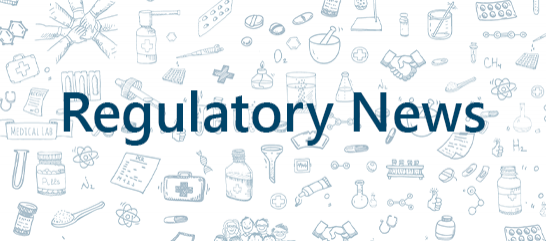
World Health Organization (WHO)
Gelatin – Draft proposal for revision: comments by 31 March
The WHO has published the proposed revised monograph on Gelatin in January 2021 for consultation. The proposed monograph is basewd on the corresponding text developed by the Pharmacopoeial Discussion Group (PDG). Please send any comments you may have on this draft working document to Dr Herbert Schmidt, Technical Officer, Norms and Standards for Pharmaceuticals, Technical Standards and Specifications (schmidth@who.int), with a copy to Ms Claire Vogel (vogelc@who.int) by 31 March 2021.
All monographs and general text under review and revision for inclusion in the International Pharmacopoeia are available here.
WHO
U.S. Food and Drug Administration (FDA)
Searchable Database Now Available for Training Resources on FDA’s Updated CDER SBIA Learn Webpage
FDA’s CDER Small Business and Industry Assistance (SBIA) has revamped its CDER SBIA Learn webpage to include a comprehensive, searchable, easy-to-use database containing hundreds of training resources including recordings to webinars and conferences.
This searchable database includes webinar and conference recordings from SBIA’s YouTube playlists from 2021, 2020, 2019 and 2018. SBIA also posts new conferences, webinars, and recordings on the SBIA LinkedIn page.
FDA
CDER Compliance Conference – Recordings available
Recordings are now available from the Small Business and Industry Education (SBIA) CDER Compliance Conference held on January 14, 2021.
FDA via IPEC-Americas
Drug Master File (DMF) Submissions on New FDA Form 3938
How will eCTD format requirements and Form 3938 change your drug master file (DMF) submissions? The new electronic Form 3938 will provide a standardized fillable electronic form to accompany all new DMF submissions, DMF amendments and annual reports. Form 3938 will not only standardize the required material but will capture all relevant DMF submission information in the eCTD format and allow for the automated pull of DMF information into FDA databases.
FDA via IPEC-Americas
FDA’s Office of Generic Drugs Receives Approval to Undergo Reorganization
On January 8, 2021 the U.S. Food and Drug Administration’s Center for Drug Evaluation and Research (CDER) announced the approval of the Office of Generic Drugs’ (OGD) reorganization. The new structure, which will become effective at a later date in 2021, will strengthen OGD’s operations and allow the office to meet the evolving needs of generic drug review while upholding FDA’s international reputation as the gold standard in the assessment and monitoring of generic drugs.
RAPS
Controlled Correspondence Related to Generic Drug Development - Guidance for Industry
On December 16, 2020, FDA announced the availability of the final guidance for industry entitled “Controlled Correspondence Related to Generic Drug Development.”
This final guidance provides information on the following:
- Process by which generic drug manufacturers and related industry can submit controlled correspondence to FDA requesting information related to generic drug development
- Agency communications related to controlled correspondence
- Process by which generic drug manufacturers and related industry can submit requests to clarify ambiguities in FDA’s controlled correspondence response
Revisions to the draft guidance include:
- Clarification on FDA’s practices regarding controlled correspondence that is related to a pending petition
- What information should be submitted with a request related to an inactive ingredient
- When FDA may determine an inquiry is a complex controlled correspondence
- The recommendation that requestors submit their controlled correspondence through the CDER Direct NextGen Collaboration Portal (more information on using the portal is available online)
While finalizing this guidance, the Agency considered comments on the draft guidance announced in the Federal Register on November 3, 2017 (82 FR 51277).
FDA
U.S. Pharmacopoeia (USP)
Proposed revision of <1112> Application of Water Activity Determination to Nonsterile Pharmaceutical Products
The USP General Chapters - Microbiology (GCM) Expert Committee proposed a revision of USP chapter <1112> Application of Water Activity Determination to Nonsterile Pharmaceutical Products. The proposal has been published for comment in Pharmacopeial Forum (PF) 47(1) with a comment deadline until 31 March 2021.
USP-PF
Inside USP Science Quick Read: Nitrosamine Impurities
A Quick Read article re-caps all activities undertaken by USP to develop strategies for nitrosamines control to help ensure the quality of medicines in the past year.
USP
Stimuli Article - Understanding the Composition and Quality of Polysorbates to Strengthen USP–NF Compendial Standards
With increased demands from stakeholders to USP to update and establish clear specifications for characterization of different polysorbate(s) (PS) compositions used in pharmaceutical development and manufacturing, the USP Excipients Expert Committee (EXC EC) proposes to revise the PS monographs by including a direct method of analysis to better understand the PS compositions and their impact on the quality of pharmaceutical drug products (including PS used for therapeutic biological drug products). This Stimuli article provides the EXC EC’s current understanding of PS compositions, their applications, recent updates to PS monographs, works in progress, challenges, and opportunities faced in strengthening the PS compendial standards. A survey (click here) associated with this Stimuli article was created to help gather additional stakeholder feedback to help the EXC EC understand their needs and engage further support for the PS monograph modernization.
Comments can be provided until 31 March.
USP-PF
Virtual Excipients Open Forum – February
On February 11-12, the US Pharmacopoeia hosted an Excipients Open forum on the topic “Setting Compendial Specifications for Excipient Composition, Organic and Inorganic Impurities.”
ICH
ICH Q9: New concept paper
ICH has published the plans for the revision of ICH Q9- the guideline on quality risk management, last updated in 2014. The rationale of the revision proposal is that the benefits of quality risk management are not yet fully implemented. In particular, a more robust application of QRM on would support the digitisation in the GMP environment and improve quality manufacturing.
ICH
PIC/S
ANVISA joins PIC/S, Russia and Jordan apply for PIC/S membership
Brazil’s Agência Nacional de Vigilância Sanitária (ANVISA) joined the PIC/S as from 1 January 2021. The PIC/S Committee then unanimously decided by written procedure completed on 27 November 2020, on the participation of ANVISA in PIC/S.
PIC/S
Revision of PIC/S Aide Memoires (PI 009-4; 024-3; 028-2; 038-2)
The following PIC/S guidance documents have been revised:
- PI 009-4 Aide Memoire on Utilities
- PI 024-3 Aide Memoires on Biotech
- PI 028-2 Aide Memoire on Packaging
- PI 038-2 Aide Memoire on Assessment of QRM Implementation
The revision process consisted in updating the cross-references to the PIC/S GMP Guide. No other changes were made. The revised Aide Memoires entered into force on 1 January 2021.
PIC/S
Calendar
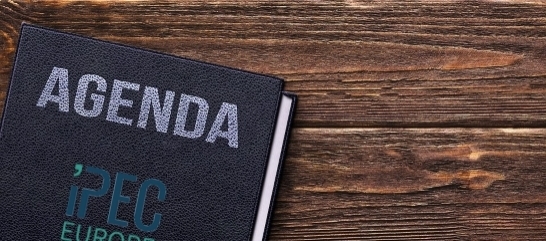
All meetings are scheduled to take place online (TC) until further notice.
|
Group
|
2021
|
Catch-up on IPEC Europe
and IPEC Federation Activities |
25 March
REGISTER NOW |
|
IPEC Europe Board
|
22 April
10 June
14 September
24 November
|
|
Good Distribution Practices Committee
|
TBA
|
|
Quality & Regulatory Affairs Committee
|
4 March
27 April
1 July
16 September
16 December
|
|
Multicompendial Compliance TF
|
3 March
|
Recommended readings

FDA Chooses Not to Perform Virtual Inspections in Contrast with Non-U.S. Agencies
Health authorities rely on inspections of pharma manufacturing facilities as a critical element of the drug approval process and insurance of compliance to Good Manufacturing Practices (GMPs). However, during the COVID-19 pandemic, travel and in-person visitation have been restricted, creating challenging scenarios for health authority inspections and creative solutions. Inspectorates outside the United States have been using virtual inspections for pharma manufacturing facilities. The U.S. FDA, however, has not.
An opinion piece published on Bloomberg in December 2020, “FDA Fiddles With Remote Drug Inspections While Pharma Burns” was highly critical of the agency’s failure to develop and alternative to on-site inspections during the pandemic.
REDICA Systems
The importance of disaccharide excipients in biologics
Many biologic formulations use a variety of high-purity injectable grade disaccharide excipients to ensure functionality and stability of the final product. In this article, Sunil Kumar Nataraj, Bastiaan Dickhoff and Thontesh GC explore the use of these sugars in the stabilisation of biologics and provide recommendations to manufacturers for enhancing supply chain security.
The authors detail how the IPEC Qualification Guide (link to the full guide) and various presentations outline various topics that excipient suppliers and pharmaceutical companies could and should work closely together on in order to enhance supply chain security.
European Pharmaceutical Review
|